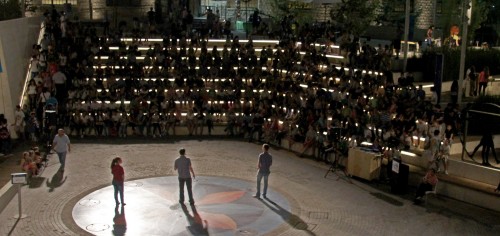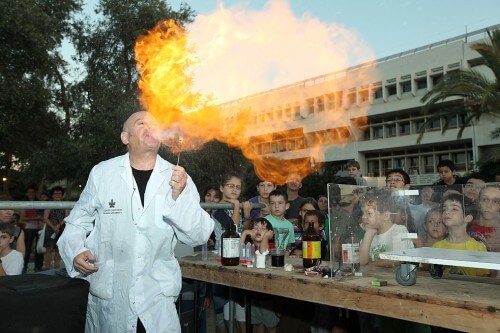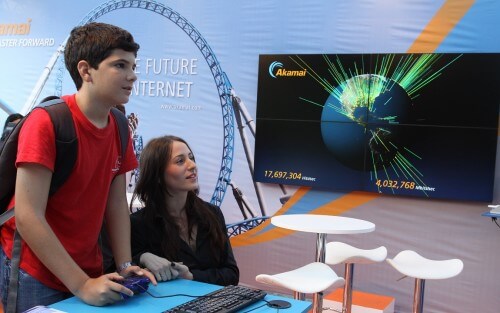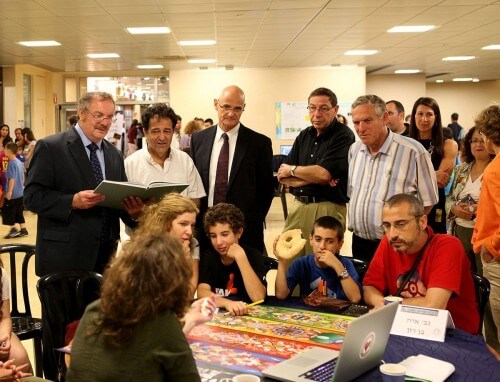The event took place as part of the scientists' night, during which a gifted boy pretended to be a computer

As part of the scientists' night that took place today, September 24, thousands of people participated who were asked to decide on a question that scientists have been debating since the 50s - should computers have intelligence like humans. In a first-of-its-kind entertainment that simulates the Turing Test, initiated by the Ministry of Science and Technology, the participants were asked to identify who among the contestants in the entertainment, led by Avery Gilad - the science-loving model Adi Neuman, the CEO of Intel Israel Maxine Fassberg, the chairman of the Israel Space Agency at the Ministry of Science, Prof. Alof (resp. ') Yitzhak Ben-Israel and a gifted boy named Yonatan Bunzel - he impersonates the computer.
Most people had difficulty identifying definitively which of the four contestants was the computer. However, more than a quarter (27%) of the voters were able to identify the computer impersonator - the gifted boy Yonatan Bunzel. About a third identified Prof. Ben-Israel as a computer, 22% identified the model Adi Neuman as a computer, while 21% identified the CEO of Intel as a computer.
In fact, the computer managed to "trick" most of the participants into thinking that the answers are from a human being and that he has intelligence. About 12 people participated in the votes, collected from the 2500 centers of the Night of Scientists and a special voting application on Facebook of the Ministry of Science and Technology.
During the entertainment, Avery Gilad asked the participants questions aimed at helping the audience find out which of them is an impostor who got his answers from the computer. Some of the questions were trivia questions and some were designed to teach about life experience and emotional intelligence - questions that the computer had a little more difficulty answering.
The test was put together in consultation with leading academics in the field such as Israel Prize winner for computer science Prof. David Harel, Prof. Nahum Dershowitz and Prof. Lior Wolff from Tel Aviv University and the Chief Scientist of the Ministry of Science and Technology Prof. Ehud Gazit. After composing the questions, they were fed into several computer programs that won the Lobner competition for Turing test programs and trivia programs.
"Since the majority of the audience did not recognize the computer impersonator, they believed that these were human answers - and therefore it can be said with caution that the computer passed the Turing test, at least in this game," Science and Technology Minister Prof. Daniel Hershkowitz said today in response to the results. "It is true that the experiment was not conducted under strict laboratory and control conditions and it is a game whose goal is to make science accessible, but the fact that over three quarters of the voters attributed the computer's answers to the humans shows that, at least for them, the computer successfully passed the Turing test."
So far, very few computer programs have passed the Turing test successfully and never completely. There are several conversational programs that have been successful in the Lobner competition for the Turing test, and well-known are the "Deep Blue" programs that beat Garry Kasparov and "Watson" that won the knowledge game Jeopardy.
The Night of the Scientists was held for the seventh year in universities and science museums throughout the country in cooperation with the Ministry of Science and Technology and the European Union and with the national concentration of the MedaTech Museum. On this evening, research and science institutions across the country open their doors to the general public free of charge and offer face-to-face meetings with scientists, laboratory tours, lectures, experiential workshops, sessions and diverse activities. This year the events were marked by computer science on the occasion of the 100th anniversary of the birth of Alan Turing, the father of computer science.
The Night of Scientists events took place at the following institutions: Medatech, the Science and Space Museum in Haifa; Bloomfield Science Museum in Jerusalem; Haifa University; the Technion; Galil Migal Knowledge Center in Kiryat Shmona; Weizmann Institute in Rehovot; Hebrew University of Jerusalem; Tel Aviv University; The Open University in Ra'anana; Sami Shimon College in the Ashdod and Be'er Sheva campuses; and Ben Gurion University of the Negev.
Thousands participated in the Night of Scientists 2012 events at Tel Aviv University

Thousands of children, teenagers and families participated tonight in the Night of Scientists events held at Tel Aviv University. At the colorful event, there were tours of laboratories and lectures on groundbreaking research, scientific experiments were demonstrated at eye level, and a chess tournament was held on a giant screen with audience participation.
5000 participants in the night of the scientists at the Technion
The president of Intel Israel, Molly Aden: "In the coming years we will walk around with a chip that is inside us"
5000 young men and women participated in the "Night of the Scientists" at the Technion, and enjoyed dozens of events with the participation of leading researchers and industrialists. A wide variety of performances and activities, including an avenue of pavilions of the leading hi-tech companies in Israel, robots, a hall of advanced computer games,
Interactive lectures and a missile firing simulator were made available at the event. For one evening, the Technion became a huge science festival for families, children, teenagers, soldiers, students and adults, who came to the Technion to celebrate the "Night of the Scientists", to get to know, experience and learn about the front of Israeli technology from the leaders of the Israeli academy and industry.

The president of the Technion, Professor Peretz Lavie, and Professor Eli Biham, Dean of the Faculty of Computer Science, hosted the Minister of Science, Prof. Daniel Hershkovich, the Ambassador of the European Union, Andrew Standley, the founder of Comigo and M-Systems, Dov Moran, and the President of Intel Israel at the Technion's Faculty of Computer Science. , Molly Aden.
The president of the Technion, Peretz Lavi, greeted the thousands of participants who came to the event and said he was happy to open the gates of the Technion to the large young crowd.
The Minister of Science, Daniel Hershkowitz said, "The State of Israel is a scientific and technological power and not in proportion to its size. Here at the Technion, we see the human capital that makes it happen."
Molly Aden referred to the relationship between humans and computers. According to Aden, the relationship with computers is expected to be similar in the coming years to the relationship that currently exists between humans. According to him, the relationship between man and machine will be natural and intuitive. And not only that, but computers will be an integral part of humans. "The computer went from being a mainframe to a desktop computer. And hence to a laptop that every person carries with them and a mobile phone that is with each of us. In the coming years, we will walk around with a chip inside us," explained Aden.
Later in his speech, the president of Intel referred to the connection of technology studies to the Israeli startup nation. "The youth who are here at the night of the scientists are the same people who will have to bear the burden of responsibility for the growth of the high-tech industry in Israel. We must invest in technological education to put high school graduates in a more competitive position compared to the rest of the world." Aden noted in his speech that "a good place in the middle is not a good place". According to him, the trend of innovation in recent years has accelerated to a great extent. "The great challenge facing the students is a bigger challenge than the challenge the current high-tech generation is facing," Aden explained in his speech.
European Union Ambassador Andrew Standley signed the event and said that he was very excited to be at the Technion and that the relations between the European Union and Israel are warm and close, and in the field of science they are infinitely warmer. He said "we are celebrating a double celebration here tonight: 100 years of Turing and 100 years of the Technion".
Hundreds of visitors to the Scientists' Night 2012 at Haifa University

Hundreds of children, teenagers and adults came this evening (Monday) to the "Night of the Scientists" events held at the University of Haifa under the theme, "Between a computer and a thought", where they met with the university's researchers, entered the laboratories and were exposed to the scientific and academic activities related to computers, starting with dismantling computers, Through the use of "virtual reality" in rehabilitation to lectures on artificial intelligence and its meaning.
The many guests also met with the Minister of Science Prof. Daniel Hershkowitz and the European Union Ambassador to Israel Andrew Stadnelly, who came to watch the events closely. "The public in Israel, from young to old age, continues to show year after year that it is thirsty for science and knowledge, and our role in the academy is to meet this need," said university president Prof. Aharon Ben-Zev.

5 תגובות
The test was very very amateurish to say the least, in a real Turing test the participants are supposed to have a real conversation in front of the computer/person and not a collection of questions and answers as we have seen here, the test is also supposed to be conducted in the form of a chat in front of a computer screen without the participants seeing who is in front of them, of course That can affect the result.
It also seems that the facilitator Avery Gilad also asked the participants spontaneous questions when they no longer had contact with the computer (for example when he asked the child what the book he read was about) and this is no longer fair at all because he forces the participant who received answers from the computer to improvise the answer himself without the computer giving to him
In short, extremely amateur.
Adi Neuman is like an Apple computer (macbook air)
If I remember Thomas is a professor of chemistry, isn't he?
I'm not jealous of Tselem who didn't heed the warnings and took the spit of fire from Tomas. Although he got a great picture
At least I succeeded. Well, that's crowd intelligence. It is possible to estimate the weight of cows (if you visit the village), but you will not be able to save cancer patients.